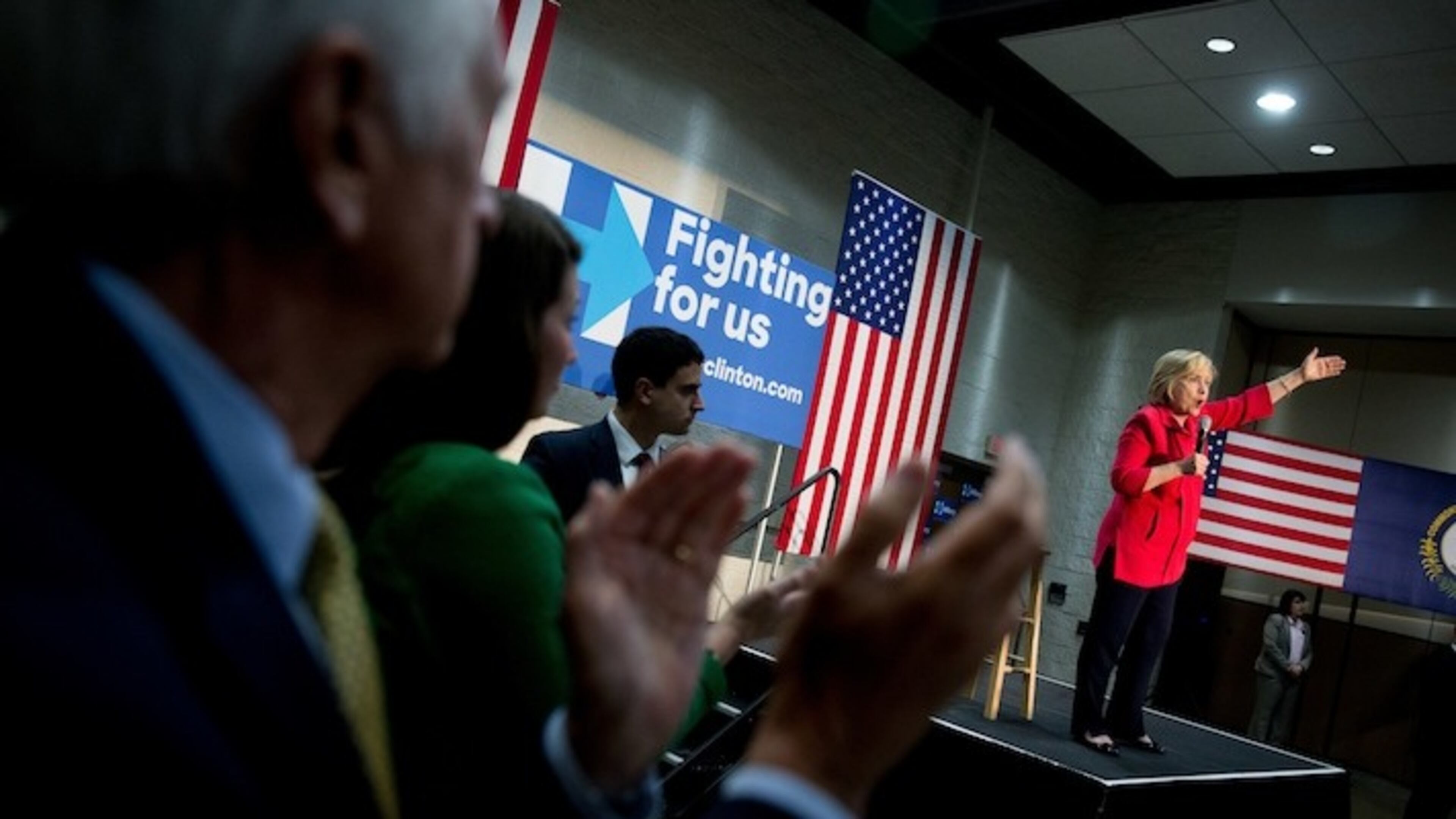Shadow banks Clinton flags as risky put millions into her run

Hillary Clinton has vowed to be tougher on Wall Street than any other presidential candidate, but that hasn't stopped the financial industry from sending a flood of cash to help elect her.
That includes segments of finance she has singled out for greater oversight in her plan to rein in "shadow banking," where financial companies act like banks without being regulated like them. Hedge funds, private equity and insurance executives, who could face greater oversight under the plan, have given a combined $24.9 million to Clinton and the super-PACs supporting her, a Bloomberg review of campaign finance records shows.
Throughout her campaign, Clinton has taken a hard line on Wall Street interests. She came out in favor of the Commodity Future Trading Commissions' efforts to prevent hedge funds and other traders from excessive speculation in oil and metal markets. She also endorsed a Labor Department rule that seeks to rein in biased investment advice from brokers who handle retirement accounts. The finance industry has lobbied aggressively against both regulations.
Those positions, however, haven't been enough to beat back criticism that she's too close to the industry. Bernie Sanders, her opponent, has made tightening bank regulations a centerpiece of his campaign, and he has repeatedly attacked Clinton for lucrative speeches she gave to Wall Street firms following her tenure as U.S. Secretary of State.
Marc Lasry, a longtime Clinton donor and chairman of hedge fund Avenue Capital Management, said that Clinton's Wall Street contributors view her as reasonable and unlikely to take policy positions that aren't feasible.
"There's a sense on Wall Street that Hillary is extremely smart and will figure out what to do that's in the best interests of the country, which at times will not be in the best interests of Wall Street," Lasry said.
When Sanders has called for the biggest banks to be broken up, Clinton has been quick to say she, too, would break up any financial institution that fails a systemic risk test, as outlined in the 2010 Dodd-Frank Act. But, she says, broader regulations are needed.
"I support Dodd-Frank," she said in an April 14 debate with Sanders. "But I have consistently said that's not enough. We've got to include the shadow-banking sector."
The Financial Stability Board, an international organization that promotes global financial stability, estimated in 2015 that the U.S. has the largest shadow banking sector with $14.2 trillion in assets, about one-third of the world's total. The entire U.S. economic output that year was $17.6 trillion.
In highlighting the risks posed by shadow banks, Clinton frequently notes the example of American International Group Inc. The insurer had agreed to back securities that were tied to home loans before the 2008 financial crisis. When the mortgage market tanked, the company was on the hook for billions of dollars of payments and ended up needing a bailout from the federal government. As banks face more and more rules, Clinton says she's concerned that more financing arrangements will move to less-regulated companies.
"Hillary Clinton has proposed the toughest Wall Street reform plan of any candidate because she believes that the measure of our success must be defined by how much incomes rise for hard-working families, not just CEOs and money managers," said Josh Schwerin, a spokesman for the Clinton campaign.
As part of her plan on shadow banking, Clinton calls for higher margin and collateral requirements for short-term borrowing like repurchase agreements, new rules for brokers on leverage, and more disclosure for hedge funds and private equity firms.
"It's a plan," Lasry said, "and I think there will be additions or subtractions later on, but I think it's a good start."
Hedge fund operators have contributed $17.7 million toward electing Clinton, including a $7 million donation by George Soros to Priorities USA Action, the main super-PAC supporting Clinton, and $7.5 million from James Simons, the founder of Renaissance Technologies. Both Soros and Simons are long-time supporters of Democratic candidates and liberal causes, and each donated to Clinton's 2008 presidential and 2006 Senate campaign.
Executives of the Blackstone Group LP contributed $151,000, while employees of Centerbridge Partners gave $140,000 and Oaktree Capital Management LLC, $72,000. Private equity firms have donated $6.7 million, while insurers, excluding those in the healthcare field, have contributed $515,000.
The 20 largest banks by assets -- a group that includes JPMorgan Chase & Co., Bank of America, Citigroup, Morgan Stanley and Goldman Sachs Group -- contributed $1.1 million.
Jeb Bush and Right to Rise USA, the super-PAC that supported him, raised more from the financial industry than Clinton did, some $34.3 million before Bush suspended his campaign at the end of February. Marco Rubio's effort benefited from $21.6 million, while Ted Cruz and his super-PACs received $17.2 million. Sanders, who doesn't have a super-PAC, has received about $310,497.
The extent to which any firm would be affected by Clinton's policies isn't clear.
"Depending on the details, her plan could hit them quite hard," said Dennis Kelleher, CEO of Better Markets, which advocates for stricter financial regulations. "The real problem is that we don't know, and we won't know until we see the details."
Hauling in contributions from brokers, bankers and insurers isn't unusual for someone who has served as a New York Senator. In her two campaigns for that office, she raised a total of $11.2 million from financial, insurance and real estate interests, according to the Center for Responsive Politics. Five of her top ten contributors were big banks.
"I think it is perfectly reasonable for people to be concerned about anyone running for office getting enormous contributions from any one industry," Kelleher said. "But if you look at her plan, you look at what she's saying, there isn't any indication so far that it's caused her to take positions they want."

